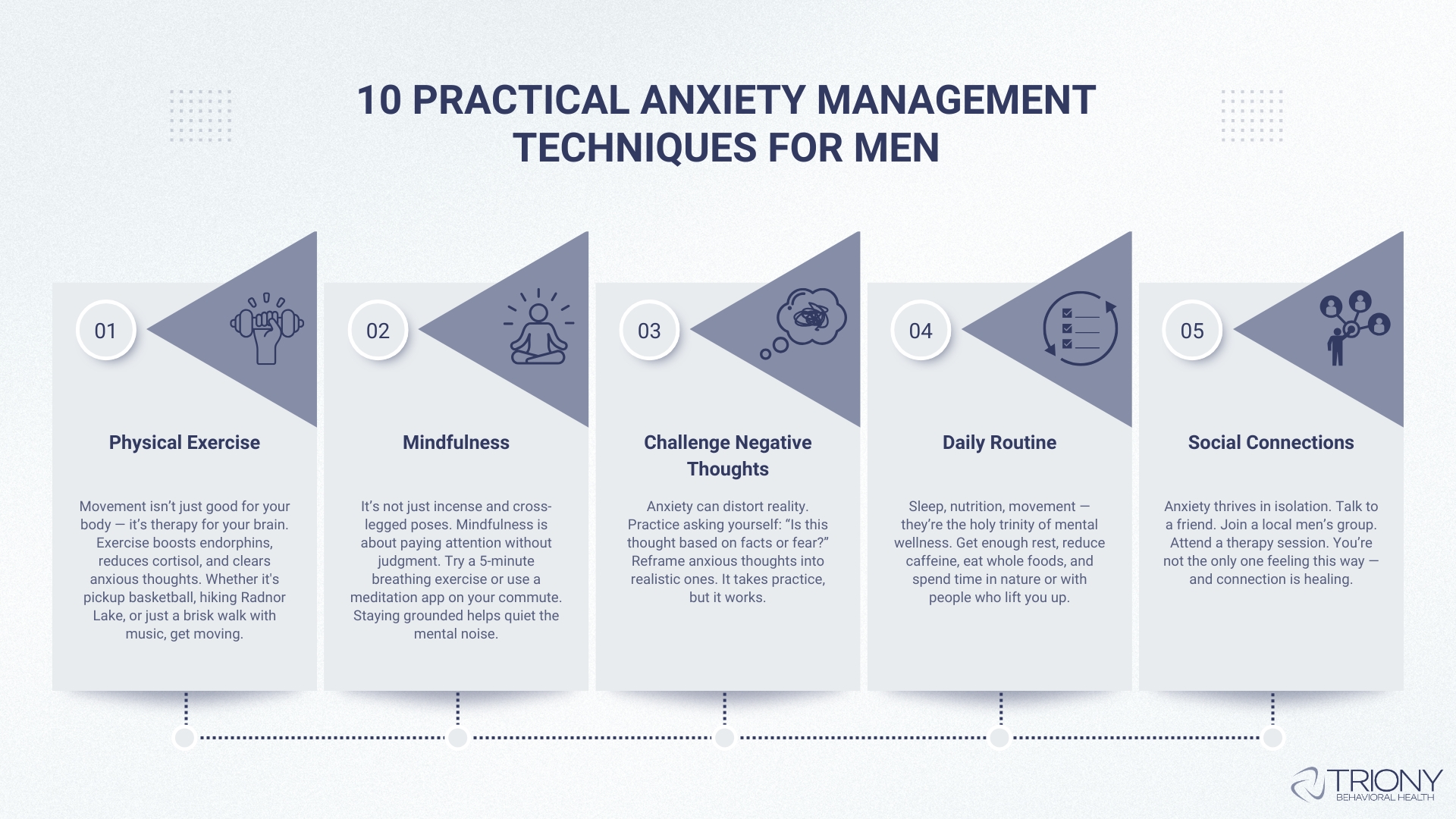“Men are taught to apologize for their weaknesses, but what if we started seeing vulnerability as a form of courage instead?”
— Brené Brown
Why Men in Nashville Struggle to Seek Mental Health Support
Men across the country often face mental health challenges in silence — and Nashville is no exception. In fact, only 60% of men report getting routine medical care each year, and even fewer seek mental health support. That silence can lead to worsening symptoms, strained relationships, and declining quality of life.
Stigma, Silence, and Delayed Care
Whether it’s due to cultural expectations, upbringing, or pride, many men hesitate to speak up about anxiety. But avoiding help doesn’t make anxiety go away. It burrows deeper — interfering with work, sleep, and relationships.
The Impact of Untreated Anxiety
Unchecked anxiety can lead to panic attacks, irritability, fatigue, and even physical health issues like high blood pressure. That constant edge-of-your-seat feeling? It doesn’t have to be your new normal.
Understanding Anxiety in Men
Common Symptoms You Shouldn’t Ignore
Men may show anxiety differently. You might notice:
- A racing heart or tight chest
- Difficulty focusing
- Feeling overwhelmed or keyed up
- Trouble sleeping
- Irritability or short temper
It’s not always panic attacks. Sometimes, it’s subtle — like constant tension or avoiding certain situations.
When Everyday Worry Becomes a Disorder
A bit of stress before a big deadline is normal. But if anxiety is hijacking your thoughts daily or making you avoid life altogether, it might be time to consider an anxiety disorder diagnosis.

10 Practical Anxiety Management Techniques for Men
There’s no one-size-fits-all fix, but these science-backed tools can help men in Nashville build a healthier relationship with their anxiety.
1. Physical Exercise and Staying Active
Movement isn’t just good for your body — it’s therapy for your brain. Exercise boosts endorphins, reduces cortisol, and clears anxious thoughts. Whether it’s pickup basketball, hiking Radnor Lake, or just a brisk walk with music, get moving.
2. Mindfulness, Meditation, and Staying Present
It’s not just incense and cross-legged poses. Mindfulness is about paying attention without judgment. Try a 5-minute breathing exercise or use a meditation app on your commute. Staying grounded helps quiet the mental noise.
3. Progressive Muscle Relaxation
Feeling tense? Try tensing and releasing muscle groups from your toes to your head. This helps your body recognize the difference between stress and calm.
4. Challenge Your Negative Thoughts
Anxiety can distort reality. Practice asking yourself: “Is this thought based on facts or fear?” Reframe anxious thoughts into realistic ones. It takes practice, but it works.
5. Practice Small Acts of Bravery
Avoidance can feed anxiety. Start small. Nervous about public speaking? Try reading aloud at home or volunteering to introduce yourself at a networking event. Small wins build confidence.
6. Build a Healthy Daily Routine
Sleep, nutrition, movement — they’re the holy trinity of mental wellness. Get enough rest, reduce caffeine, eat whole foods, and spend time in nature or with people who lift you up.
7. Plan “Worry Time” Strategically
Worrying all day? Set a 10-minute block daily to let your mind run wild — and then move on. It’s a surprisingly effective strategy to compartmentalize your anxiety.
8. Keep a Journal to Track Triggers and Patterns
You don’t need to be Hemingway. Just jot down what made you feel anxious and what helped. Over time, you’ll spot trends and gain more control.
9. Seek Out Strong Social Connections
Anxiety thrives in isolation. Talk to a friend. Join a local men’s group. Attend a therapy session. You’re not the only one feeling this way — and connection is healing.
10. Be Kind to Yourself Through Self-Compassion
Give yourself a break. You’re human. The pressure to “man up” and hold it all together can make anxiety worse. Try treating yourself like you would a close friend.
When to Seek Professional Help
Signs It’s Time to Talk to a Mental Health Provider
If anxiety is affecting your sleep, relationships, or work — or if you feel trapped by fear or dread — it’s time to get support. You don’t have to reach a breaking point to get help.
What to Expect From Therapy and Treatment
Therapy isn’t about lying on a couch — it’s about gaining tools. Cognitive Behavioral Therapy (CBT), mindfulness-based approaches, and sometimes medication can change how you respond to anxiety. Treatment is tailored to your needs and goals.
Finding Men’s Mental Health Support in Nashville
Nashville has a growing network of mental health providers who understand the unique pressures men face. Whether you’re dealing with job stress, relationship strain, or social anxiety, local professionals can help. Triony Behavioral Health offers personalized support designed specifically with men in mind.
Frequently Asked Questions About Anxiety Management for Men
How do I know if I have anxiety or if I’m just stressed?
Stress is typically tied to a specific situation and goes away when the issue is resolved. Anxiety, however, often lingers even without a clear cause. If you’re feeling overwhelmed, on edge, or unable to relax for extended periods — it may be more than stress.
Is anxiety different in men than in women?
Yes, men often express anxiety through irritability, anger, or physical symptoms like muscle tension or fatigue. They’re also more likely to avoid talking about their emotions, which can delay treatment or recognition.
Can lifestyle changes really help manage anxiety?
Absolutely. While therapy and medication are effective, lifestyle changes — like regular exercise, quality sleep, and mindfulness — can significantly reduce symptoms and improve overall mental health.
What kind of therapy works best for men with anxiety?
Cognitive Behavioral Therapy (CBT) is highly effective and often a good starting point. Some men also benefit from mindfulness-based therapy, solution-focused therapy, or even group therapy, depending on personal comfort and needs.
Do I need medication to treat anxiety?
Not always. Many men manage anxiety successfully with therapy and coping strategies alone. However, if symptoms are severe or persistent, medication can be a helpful tool in combination with therapy. It’s best to discuss options with a licensed provider.
Is it normal to feel ashamed about asking for help?
Unfortunately, many men do feel that way — but there’s no shame in taking care of your health. Asking for help is not a weakness; it’s a responsible, courageous step toward healing.
Final Thoughts: Breaking the Cycle Starts With One Step
Anxiety doesn’t make you weak — it makes you human. And learning how to manage it is one of the strongest things you can do. Start with one strategy. Take one deep breath. Make one call. Healing begins with a single decision to show up for yourself.
Triony Behavioral Health offers anxiety treatment services tailored to men in the Nashville area.
Call us today at 1-888-689-1432 to take that first step.
Schedule consultation
Building a Foundation of Trust and Support
"In the midst of chaos, there is also opportunity." At the core of our services lies a deep commitment to creating a safe, supportive environment. We believe that a strong support system is crucial for healing and growth. Our team of compassionate professionals is dedicated to walking alongside you, offering guidance and understanding at every step of your journey.





